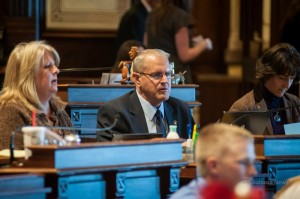Rozenboom Report – 3-5-2015
On February 24, 2015 both the Iowa House and the Iowa Senate passed Senate File 257, commonly referred to as the gas tax bill. By the end of the same week Governor Branstad had signed the bill into law; the new gas tax rates went into effect on March 1. This culminated a debate that has been going on for many years in Iowa; a debate that intensified in 2011 when the Governor established a task force to study and report on the condition of Iowa’s road and bridge infrastructure. To the surprise of no one, the report determined that Iowa’s road system was deteriorating.This letter is to let you know what the passage of SF 257 means to Mahaska County and to the city of Oskaloosa. I have requested the best estimate of the financial impact for each county from the Iowa Department of Transportation, based on the final language of SF 257. That estimate for Mahaska County is $511,019 for secondary roads, $153,112 for farm-to-market roads, and $6,796 for Transfer of Jurisdiction. That totals $677,723 of new money for Mahaska County roads annually. For the city of Oskaloosa, new revenue totals $190,278 annually. Smaller cities in Mahaska County will also receive additional dollars as the funding formula dictates. These numbers are expected to go up slightly later in March when the DOT updates their annual projections.
One of the criticisms of the gas tax bill was that the state would benefit from this increase at the expense of rural counties. That criticism is unfounded. Be assured that this new money will be distributed under the old Road Use Tax Fund (RUTF) formula which means that the counties will receive 32.5%, not the 20% share that the Time 21 formula established. Cities will continue to receive 20% as they always have.
The roads and bridges in Iowa didn’t deteriorate overnight, and they won’t be fixed overnight. Senate File 257 provides additional funding to improve Iowa’s infrastructure to the benefit of our children and grandchildren. Constituents should hold all city councils, county supervisors and state legislators accountable to use this increased funding wisely.
Senator Ken Rozenboom















